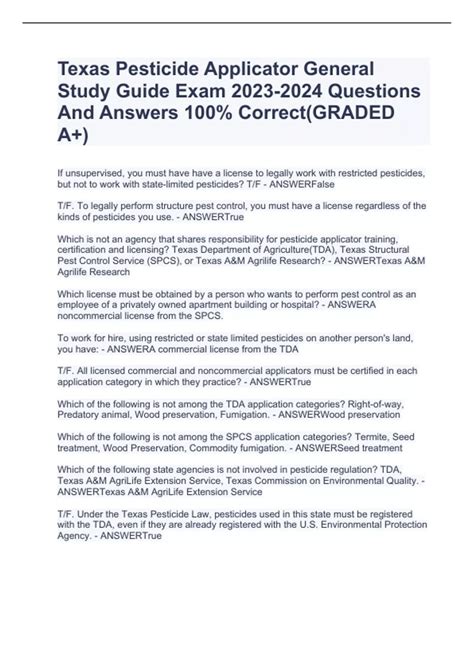Preparing for the Texas Pesticide Applicator License Test can be a daunting task, but with the right study guide and preparation, you can feel confident and ready to pass the exam. In this article, we will provide an overview of the test, the types of licenses available, and a comprehensive study guide to help you prepare.
Why is the Texas Pesticide Applicator License Important?
The Texas Pesticide Applicator License is required for individuals who apply pesticides to crops, landscapes, and other areas where pests need to be controlled. The license ensures that applicators have the knowledge and skills necessary to apply pesticides safely and effectively, minimizing the risk of harm to humans, animals, and the environment.
Types of Licenses
There are several types of pesticide applicator licenses available in Texas, including:
- Commercial Applicator License: required for individuals who apply pesticides for hire
- Private Applicator License: required for individuals who apply pesticides on their own property or on property owned by their employer
- Non-Commercial Applicator License: required for individuals who apply pesticides for non-commercial purposes, such as for a school or government agency
Study Guide
To prepare for the Texas Pesticide Applicator License Test, you will need to study the following topics:
Pesticide Safety and Handling
- Personal protective equipment (PPE)
- Safe handling and storage of pesticides
- First aid and emergency procedures
- Pesticide label comprehension

Pesticide Label Comprehension
- Understanding pesticide label terminology
- Identifying pesticide label components
- Interpreting pesticide label instructions
Pesticide Application Equipment and Techniques
- Types of pesticide application equipment
- Calibration and maintenance of equipment
- Application techniques for different types of pesticides

Pesticide Application Techniques
- Aerial application
- Ground application
- Aquatic application
- Fumigation
Pest Management and Control
- Integrated Pest Management (IPM) principles
- Pest identification and monitoring
- Cultural controls
- Biological controls
- Chemical controls

Integrated Pest Management (IPM) Principles
- Identify the pest
- Monitor the pest population
- Set action thresholds
- Choose control methods
- Evaluate the effectiveness of control methods
Texas Pesticide Laws and Regulations
- Texas Department of Agriculture (TDA) regulations
- Environmental Protection Agency (EPA) regulations
- Label compliance
- Record keeping and reporting

Record Keeping and Reporting
- Maintaining pesticide application records
- Reporting pesticide use to the TDA
- Maintaining equipment maintenance records
Practice Exams and Study Resources
To help you prepare for the Texas Pesticide Applicator License Test, we recommend the following practice exams and study resources:
- Texas Department of Agriculture (TDA) study guides and practice exams
- National Pesticide Applicator Certification Core Manual
- Pesticide Safety and Handling training videos
- Online pesticide application training courses
Gallery of Pesticide Application Equipment and Techniques





FAQs
What is the Texas Pesticide Applicator License?
+The Texas Pesticide Applicator License is required for individuals who apply pesticides to crops, landscapes, and other areas where pests need to be controlled.
What types of licenses are available?
+There are several types of pesticide applicator licenses available in Texas, including Commercial Applicator License, Private Applicator License, and Non-Commercial Applicator License.
How do I prepare for the Texas Pesticide Applicator License Test?
+To prepare for the test, you can study the topics outlined in this article, take practice exams, and use study resources such as the Texas Department of Agriculture (TDA) study guides and practice exams.
By following this study guide and using the recommended study resources, you can feel confident and ready to pass the Texas Pesticide Applicator License Test. Remember to also practice your knowledge and skills through hands-on experience and training.
